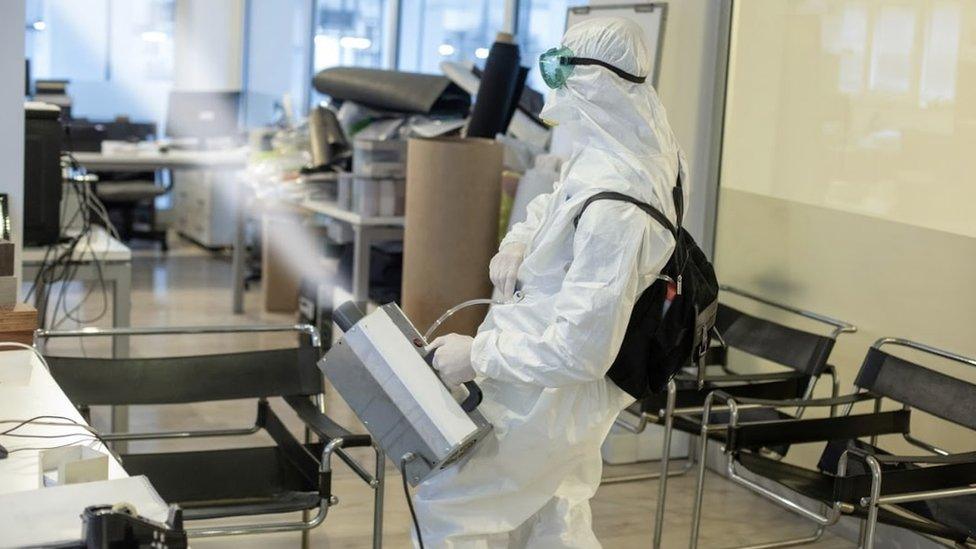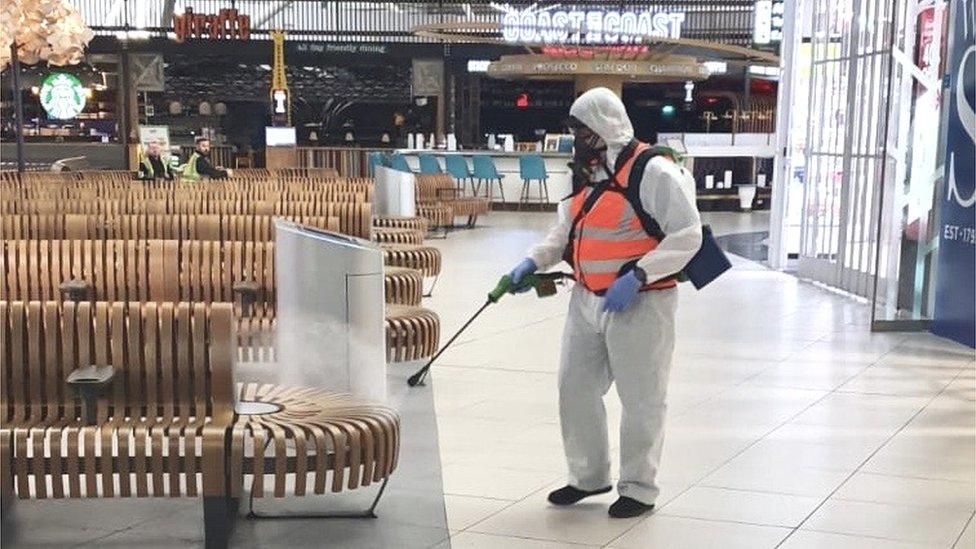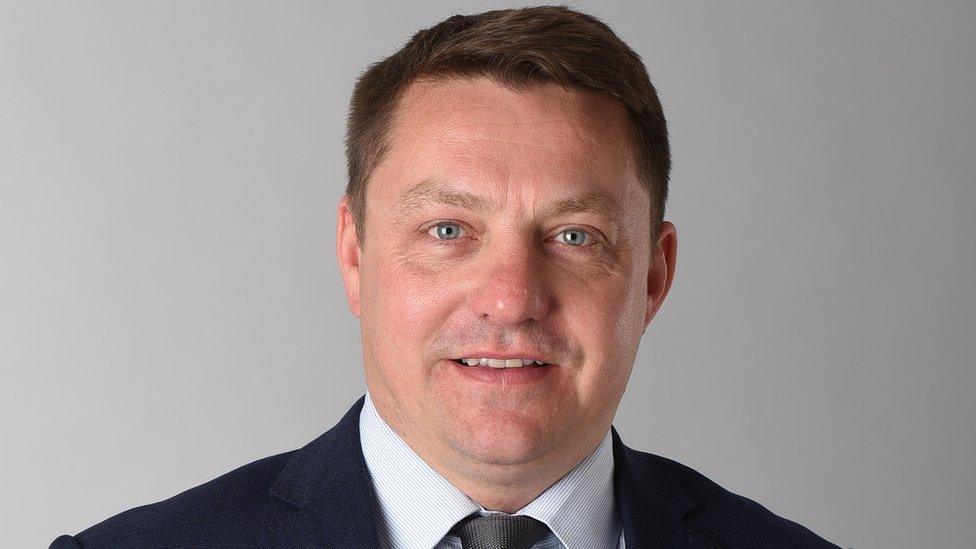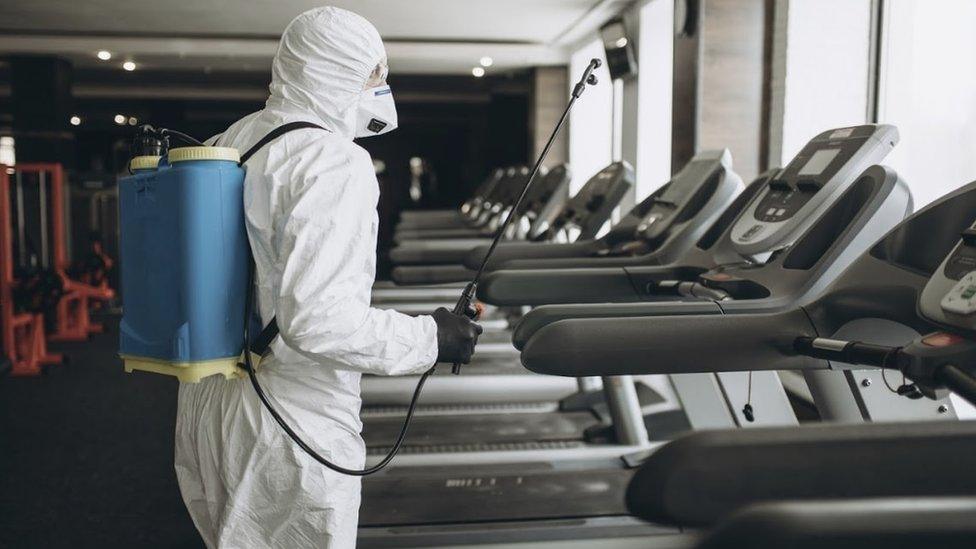Coronavirus: Fears over growth of decontamination firms
- Published

Companies are increasingly looking to have their premises cleaned
Lives could be put at risk by an influx of companies offering to clean up potential coronavirus hotspots, a leading cleaning firm has warned.
SafeGroup boss Steve Broughton said the market was being "flooded" by firms that lacked the experience or equipment to operate "safely or correctly".
Mr Broughton said the trend "worries me because something will go wrong".
His company employs more than 100 staff in Edinburgh, Croydon, Manchester and Birmingham.
Concerns have also been raised by industry standards and training body, the British Institute of Cleaning Science (BICSc).
It warned that a current lack of regulation meant "any Tom, Dick or Harriet can claim to be a cleaning professional/specialist".

SafeGroup recently decontaminated Stansted Airport
Their comments came after BBC Scotland learned that dozens of companies across the UK have launched fumigation and decontamination services following the coronavirus outbreak.
A recent survey by the British Pest Control Association found that more than a third of UK pest controllers (114 of 330 respondents) said they were now offering a Covid-19 disinfection service.
BBC Scotland also found companies in other sectors with little or no background in decontamination, including a general trades firm, that were offering to disinfect spaces such as offices, homes and supermarkets.
'Market flooded'
Mr Broughton, whose firm recently spent two months decontaminating Stansted Airport and has just secured a five-year deal to clean US bases in the UK, said: "We have been involved in working in biohazardous environments for the past 10 years so it was quite easy for us to adapt to the Covid-19 outbreak.
"However, I think there are too many companies seeking a market opportunity that don't have sufficient knowledge or the right equipment to deliver a service safely or correctly.
"The market is being absolutely flooded at the moment by people from all sorts of backgrounds and it worries me because something will go wrong.
"To use an analogy, it's like a journalist deciding to become a chef. They can write but they don't know necessarily know how to cook things safely, so people can end up being sick."

Mr Broughton says the market is being "flooded" by people from "all sorts of backgrounds"
Stan Atkins, chief executive of the British Institute of Cleaning Science, said: "Since the outbreak of Covid-19, numerous cleaning companies claim that they are 'qualified' to carry out 'deep cleans'.
"At this time there is no way of checking the validity of these claims.
"We must remember that the cleaning industry is currently unregulated, and any Tom, Dick or Harriet can claim to be a cleaning professional/specialist."
He added: "The best advice we can offer is: ensure that the cleaning contractor/s you choose to use are a member of a recognised professional cleaning industry body.
"And a word of caution - the client should always specify what they require from a decontamination clean."

The Property Support Services Group (PSS), a long-standing BICSc member which has started disinfecting several Scottish depots for cash and carry firm United Wholesale, said it was "vital that businesses don't cut corners as they plan for the easing of lockdown".
Chairman Michael Rust said: "Given the high level of training required to use the right equipment and specialist cleaning products, the clear advice to all businesses is only to use accredited cleaning companies with a long history in this sector - otherwise you're risking the safety of your workers and the public."
The Scottish government said the routine cleaning and disinfection of frequently touched objects was "vital to preventing the spread of infection in the workplace", as outlined by guidance it published, external last month.
A spokesman added: "Although trading standards is a reserved matter, we would advise that consumers in Scotland choose a reputable cleaning contractor - ideally one that is a member of a recognised professional cleaning industry body - and be wary of services that claim to provide specific anti-coronavirus measures."